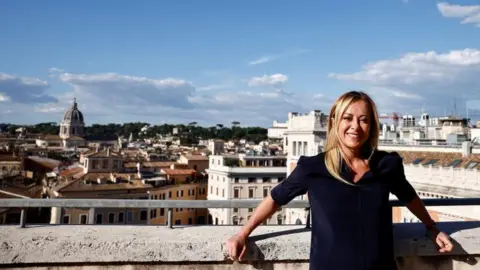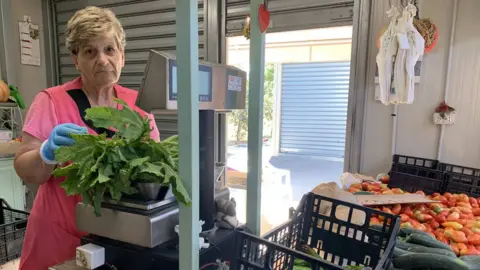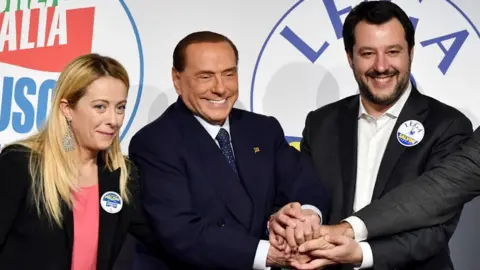Giorgia Meloni: Far-right leader poised to run Italy
 Reuters
ReutersFor 40 years, Anna Maria Tortora has sold her ripe tomatoes and fresh cucumbers to loyal customers at her market stall in Rome. Little did she realise that the young girl who used to queue up holding the hand of her grandfather would now be on course to be Italy's next prime minister.
"He was a wonderful person", she remembers, "and in love with his granddaughter."
With that little girl, Giorgia Meloni, having led her party to first place in the election, Anna Maria swells with pride. "I brought her up on my beans! She ate well, and she grew up well."
The market is in Garbatella, a working-class southern neighbourhood of Rome and traditionally a bastion of the left.
It's an incongruous origin for a politician now in pole position to become Italy's first far-right prime minister since Benito Mussolini. Once the results of Italy's snap election are confirmed, the country's president, Sergio Mattarella will consult party leaders to determine who can lead a stable government. Ms Meloni, as the front-runner, will argue she has first refusal.
"She's not representative of this area, which is historically red," says Marta, a shopper pushing her pram past the vegetable stalls. Her elderly mother, Luciana, tells me she's scared of the prospect. "I'm profoundly anti-fascist," she adds. "If she gets in, it will be a very ugly period."

The fascist label is something that Giorgia Meloni vehemently rejects. Speaking in English, Spanish and French in a recent video, she insisted it had consigned the ideology to history.
But history is part of the problem in a country which had no equivalent of Germany's de-Nazification after the war, allowing fascist parties to reform. Founded in 2012, Brothers of Italy has its political roots in the Italian Social Movement (MSI), which rose from the ashes of Mussolini's fascism.
The party maintains the logo of post-war far-right parties: the tricolour flame, often perceived as the fire burning on Mussolini's tomb.
"Giorgia Meloni doesn't want to drop the symbol because it's the identity she can't escape from; it's her youth," says Gianluca Passarelli, a professor of political science at Rome's Sapienza University.
"Her party is not fascist," he explains. "Fascism means to get power and destroy the system. She won't do that and she couldn't. But there are wings in the party linked to the neo-fascist movement. She has always played somehow in-between."

Her youth is indeed anchored on the hard right, and among humble beginnings: key to her image of a woman of the people.
Born in Rome, she was just a year old when her father, Francesco, walked out on the family and moved to the Canary Islands. Francesco was left-wing, her mother Anna was on the right, prompting speculation that her political path was motivated in part by a desire to seek revenge on her absent father.
The family moved to Garbatella, close to her grandparents. There, aged 15, she joined Youth Front, the youth wing of the neo-fascist MSI, later becoming the president of the student branch of the movement's successor, National Alliance.
Marco Marsilio was holding a meeting in the MSI office in Garbatella when Giorgia Meloni knocked on its door in 1992. Ten years her senior, he became a close friend and political ally and is today president of the Abruzzo region.
"Here was this slender girl, but always very serious and determined," he says. "You'd notice her because at student meetings, she would stop anybody grabbing the microphone off her."

Over the years, they shared family holidays, debates, and social gatherings, and he has watched her grow in self-assurance. "She had her insecurities back then," Mr Marsilio says, "but maybe that was a strength because it made her read a dossier more, rather than less, before tackling an issue."
In 2008, aged 31, Giorgia Meloni became Italy's youngest ever minister, appointed to the Youth and Sport portfolio by Silvio Berlusconi.
After forming her own party in 2012, she won just 4% of votes in the last election in 2018.
Now, as the only major party to have stayed out of Mario Draghi's national unity coalition government, Brothers of Italy have won around 26% of the vote, and her right-wing alliance with Silvio Berlusconi and the far-right League party of the former Interior Minister Matteo Salvini is set for a parliamentary majority.
 Getty Images
Getty ImagesBut even as she has sought to reassure Italy's Western allies by, for example, strongly supporting the pro-Ukraine line of the Draghi government, her hard-line conservative social policies are worrying many.
"Yes to the natural family, no to LGBT lobbies!" she thundered at a recent rally of Spain's far-right Vox party. She has called for a naval blockade of Libya to stop migrant boats.
"Meloni is not a danger to democracy, but a danger to the European Union," says Prof Passarelli, who puts her in the same mould as nationalist leaders in Hungary and France.
"She's on the same side as Marine Le Pen or Viktor Orban. And she wants a 'Europe of nations', so everyone is basically alone. Italy could become the Trojan horse of Putin to undermine solidarity, so she would enable him to continue weakening Europe."
Bidding to become Italy's first ever woman prime minister she has asserted her female identity, but, Prof Passarelli believes, in a macho, political way: "The dominance of the Italian family is the 'mamma'. She's the macho figure who controls the kitchen. Meloni uses that smartly because it goes directly to the core of our system."
For her allies, she would represent the radical political shift that Italy needs, given its long economic stagnation and a society seen as a gerontocracy.
"I feel great, like a father leading his daughter to the altar," says Marco Marsilio. "We wouldn't have founded the party unless we thought she had the potential for this."
What does he plan to tell her once the prosecco corks at her party HQ have popped?
"Go for it!", he answers. "We all wanted this so much. Now face the music."
